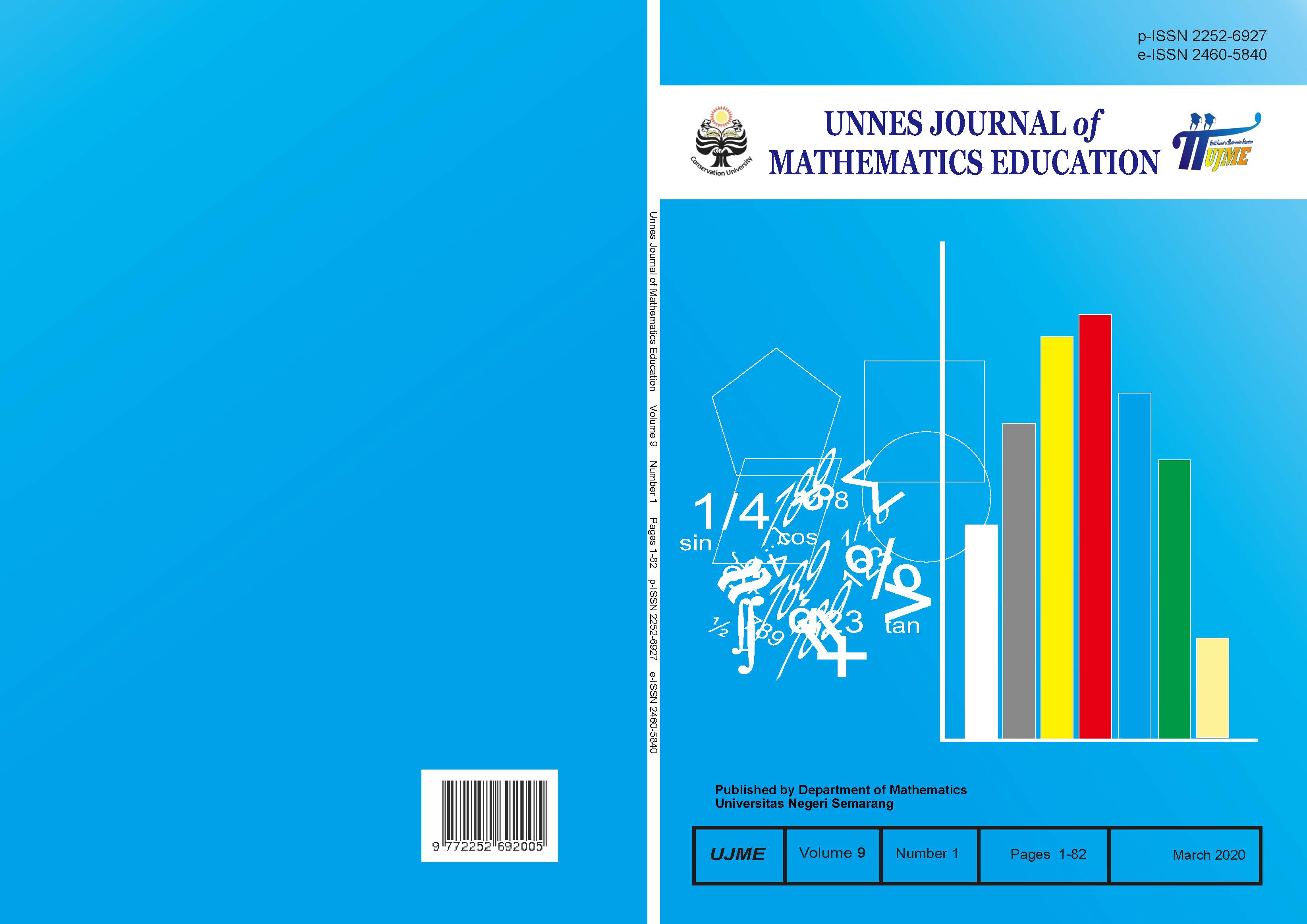Problem solving ability with mathematical modeling strategy in term of mathematics self-efficacy on Generative Learning Model
##plugins.themes.academic_pro.article.main##
Abstract
Problem Solving Ability (PSA) is the ability of students to determine how to solve a mathematical problems that have not yet been known how to solve it. Abstract mathematical concepts become obstacles in solving mathematical problems. Mathematical Modeling Strategy (MMS) is one ways that can be used to improve students' problem solving ability. In addition, one learning model that can improve students' problem solving ability is Generative Learning Model (GLM). The purpose of this study is to (1) find out whether the results of the PSA test achieve mastery learning, (2) find out whether the results of the PSA test have improved, (3) find out the relationship between the level of Mathematics Self-Efficacy (MSE) on students' PSA, and (4) describe the PSA in terms of students' MSE. The research method that used is mixed methods with quantitative methods using Pre-Experimental Design that modela is One-Group Pretest-Posttest Design. The research sample was taken with a multistage cluster sampling technique and research subjects were selected with a purposive sampling technique. The results showed that; (1) students' PSA achieve a mastery learning, (2) students' PSA have increased, (3) there is a positive influence between the level of MSE on students' PSA, (4) students with high levels of MSE tend to have better PSA than students with moderate and low levels of MSE.
##plugins.themes.academic_pro.article.details##
References
Bandura, A. (1997). Self Efficacy : The Exercise of Control. New York: W. H. Freemen and Company.
Creswell, J. W. (2009). Research Design: Qualitative, Quantitative, and Mixed Methods Approaches (Third Edit). SAGE Publications, Inc.
Kementerian Pendidikan dan Kebudayaan RI. (2014). Peraturan Mendikbud Nomor 58 tahun 2014 tentang Kurikulum 2013 Sekolah Menengah Pertama (SMP) / Madrasah Tsanawiyah (MTs), (20), 1–109.
Khasanah, U., & Dahlan, J. A. (2001). Implementation of Generative Teaching Model to Improve Junior High School Students ’ Mathematical Problem Solving Ability. Proceeding of The 1st UR International Conference on Educational Sciences, 978–979.
Lubis, N. C. P., & Surya, E. (2017). Pembelajaran Kooperatif Dalam Meningkatkan Kemampuan Pemecahan Masalah Matematika, (December).
Murtiyasa, B. (2016). Isu-isu Kunci dan Tren Penelitian Pendidikan Matematika, (Knpmp I), 1–10.
Nursyarifah, N., Suryana, Y., & Muiz, D. L. M. (2016). Penggunaan Pemodelan Matematik Untuk Meningkatkan Kemampuan Pemecahan Masalah Aritmatika Sosial Siswa Sekolah Dasar, 000, 138–149.
Pajares, F., & Miller, M. D. (1994). Role of Self-Efficacy and Self-Concept Beliefs in Mathematical Problem Solving : A Path Analysis, 86(2), 193–203.
Santos, M. L. L. P., Belecina, R. R., & Diaz, R. V. (2015). Mathematical Modeling : Effects On Problem Solving Performance and Math Anxiety of STUDENTS. International Letters of Social and Humanistic Sciences, 65(2013), 103–115. https://doi.org/10.18052/www.scipress.com/ILSHS.65.103
Somakim. (2006). Peningkatan Kemampuan Berpikir Kritis Dan Self-Efficacy Matematik Siswa Sekolah Menengah Pertama Dengan Penggunaan Pendekatan Matematika Realistik.
Sulistiawati, D. (2017). Pengaruh Model Pembelajaran Generatif Terhadap Kemampuan Pemecahan Masalah Matematika. Jurnal Kajian Pendidikan Matematika, 2348(02), 219–226. https://doi.org/10.1007/XXXXXX-XX-0000-00
The National Council of Teachers of Mathematics, I. (2000). Principle and Standards for School Mathematics. Reston.
Undang-undang Republik Indonesia Nomor 20 Tahun 2003 Tentang Sistem Pendidikan Nasional. (2003).
Wena, M. (2009). Strategi Pembelajaran Inovatif Kontenporer : Suatu Tinjauan Konseptual Operasional. Jakarta: PT. Bumi Aksara.
Wittrock, M. C. (1974). A Generative Model of Mathematics Learning. Journal for Research in Mathematics Learning, 5(4), 181–196.
Yumiati. (2011). The Implementation of Generative Learning With Open-Ended Approach to Improve Mathematics Student Achievements on Muhammadiyah 44 Pamulang, 5, 978–979.
